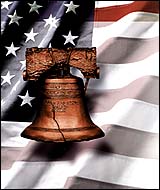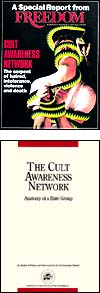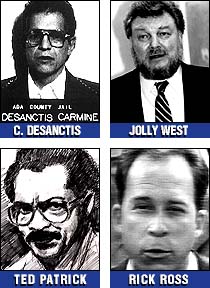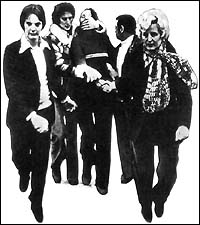

 Investigating threats to religious freedom and helping to restore liberty
Investigating threats to religious freedom and helping to restore liberty

reedom of religion has appropriately been called the most fundamental and most expansive freedom—encompassing personal belief, thought, expression and association. Religious freedom has also been that principle more vigorously disputed, defended and ultimately cherished than any other in history.
Although minority religions today may not have to fight to the death for their religious freedoms as in previous times, lesser battles and skirmishes are still commonplace. The best democracy is still no guarantee against intolerance and bigotry, and eternal vigilance is an expression that will never become obsolete.
Freedom has repeatedly examined incidents and issues of religious liberty and published its findings. The coverage has helped both public and private sectors recognize and heed warning signs of intolerance and its perpetrators, and contributed to efforts to preserve religious freedom for future generations.
Lifting the Veil of Hypocrisy
From the early 1970s, Freedom consistently reported on abuses and crimes practiced in the name of “deprogramming”-physical and mental assaults to break an individual's religious beliefs, for profit. The practice frequently involves assault, kidnapping and sometimes rape.
Freedom explored the nexus of the deprogramming movement, the Cult Awareness Network (“CAN”), and its founders, leaders, supporters and members.
Pulling on the threads of hypocrisy throughout CAN's front as an "educational" institution, Freedom found and exposed evidence of the true nature of the network. CAN preyed on the gullible, violated the civil rights of the innocent, and was linked to violence and even deaths nationwide.
Freedom's coverage, including special editions of the magazine and a white paper on the violence and crime incited by the network, helped bring vital facts to the attention of those in the fields of law and justice, as well as civil rights and religious leaders, media, and the public at large.
A past national president of CAN, Michael Rokos, typified the hypocrisy and deception that characterized CAN. After assuming office in 1989, Rokos, also a youth counselor and volunteer chaplain to the Maryland State Police, launched a savage propaganda campaign against a variety of religions. Freedom questioned why such a man would attack religions that try to uphold high moral standards. Through public records review and interviews, Freedom exposed evidence that Rokos had been arrested for soliciting lewd conduct from an undercover police officer, which he had concealed and repeatedly denied. But the truth was clear and Rokos resigned in disgrace as police chaplain and president of CAN.

| ||
 |
Freedom’s thorough coverage of the unlawful deprogramming industry and its nexus, the former Cult Awareness Network, included two special reports in the mid-1990s. |  |
Crime and Prejudice
The duplicity of CAN’s president was only the tip of the iceberg. Through its investigations, Freedom found criminality of nearly epidemic proportions amongst members of the Cult Awareness Network and made these facts known to the officials, news media and the public CAN pretended to serve. Virtually a lone voice in protesting and publishing the sordid facts, Freedom helped to bring a number of these individuals to justice.
In some cases, slow recognition and action by authorities against those in CAN who practiced such deception led to tragic consequences. There was Rick Ross, a deprogrammer highly recommended and praised by CAN, who constructed his own facade of “cult expert” for officials and media. In fact, Ross specialized in deprogrammings of Christians. His vitriolic and blatant fabrications about various religions helped fuel a climate of suspicion and fear against many minority religious groups about whom he knew nothing.
A Freedom investigation revealed that Ross had a rap sheet with at least three arrests and a felony conviction for conspiracy to commit grand theft. A psychological profile in those criminal records concluded he had little or no concept of the consequences of his actions to others or to society.
The truth about Ross did not become widely recognized soon enough to prevent the United States Bureau of Alcohol, Tobacco and Firearms (ATF) from “consulting” him during the days of the stand-off with the Branch Davidians in Waco, Texas. Ross promoted the notion that the Davidians would probably not come out willingly and that measures would have to be taken to force them out. That advice contributed to an American tragedy.
Freedom also examined the broader aspect of CAN’s influence on events at Waco which led, ultimately, to more than 80 men, women and children losing their lives. The unequivocal evidence helped lead such noted scholars as Professor Nancy T. Ammerman, then on a special project at Princeton University, to conclude in a September 1993 report to the Justice and Treasury Departments that “The Network [CAN] and Mr. Ross have a direct ideological (and financial) interest in arousing suspicion and antagonism against what they call ‘cults’”.

| ||
 |
Freedom investigated the duplicity which permeated the deprogramming network starting with founder and three-time convict Ted Patrick, and deprogramming architect Louis Jolyon “Jolly” West. By 1996, the network disbanded following arrests of more than a dozen deprogrammers and a $4.85 million judgement against CAN and several deprogrammers for one failed kidnapping. |
After the tragic—and unnecessary—deaths of the Branch Davidians, ATF and FBI officials involved were sharply censured for giving credence to CAN, and for believing them. Government took a step back, Congress held hearings, and safeguards were put in place to ensure that in any similar circumstances in the future, actual experts on religion will be consulted.
In the wake of Freedom’s investigatory exposes into CAN, between the late 1980s and early 1990s more than a dozen of the United States’ top deprogrammers—including CAN’s chief of security—were arrested and many convicted.
By 1996, the Cult Awareness Network and several of its deprogrammers—including Rick Ross—owed $4.8 million in compensatory and punitive damages, awarded by a Washington State jury to a young Christian man who was subjected to a violent deprogramming attempt by Ross and two associates.
Federal Court Judge John Coughenour pointed out that each of the defendants seemed “incapab[le] of appreciating the maliciousness of their conduct....”
When CAN and Ross declared bankruptcy and appealed in an attempt to circumvent the punishment, the 9th Circuit Federal Appeals Court handed down a landmark decision upholding the verdict in all respects.

|
The Court of Appeal found that: “In summary, there is sufficient evidence...to establish that ...CAN functioned through its contact people; that CAN members routinely referred people to deprogrammers; and that CAN was aware of Ross and the fact that he conducted involuntary deprogrammings.... [T]he evidence establishes that CAN members routinely referred callers to deprogrammers, including involuntary deprogrammers.”
Such was the new climate of intolerance for religious bigotry, which Freedom helped to establish, that the Cult Awareness Network folded up and no longer serves as a threat to religious liberty. Today, a reconstituted CAN actively and constructively applies the group’s original mandate to “educate the general public regarding religious rights, freedoms and responsibilities” and has a trail of happy-ending stories to its credit—reunited families, heightened trust and respect, and a healthy tolerance for religious diversity.
Freedom editions in other lands, from the United Kingdom to Australia, have likewise exposed how deprogramming breaks up families and destroys lives, and have been effective in restraining the destructive practice.
Freedom has also probed beyond CAN’s deprogrammers and discovered the nature and motives of those whose false theories of religious “brainwashing” helped motivate the deprogramming movement and justify its criminal assaults.
Chief among the deprogramming network’s mentors has been Dr. Louis Jolyon West, who heavily advocates drugging, and wrote that “the drug-free state of mind” is an “antiquated position.” West has extensively experimented with the use of powerful hallucinogenic drugs, including a lethal test on an elephant with a dose of LSD 1,500 times that which would be needed to send a human on a full-scale trip. In the 1990s West was dismissed from his lucrative position as the head of the University of California Los Angeles (UCLA) Neuropsychiatric Institute after evidence suggested misuse of government funds. Freedom also investigated West’s highly racist theories about crime [See “Equal Rights and Social Justice”]
Freedom uncovered the motivations and practices of other CAN mentors and icons, with similar findings of prejudice, bigotry and hypocrisy.

